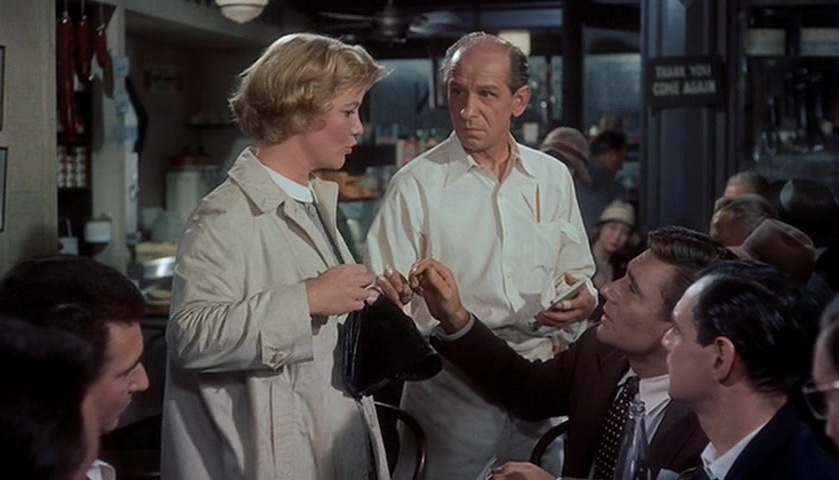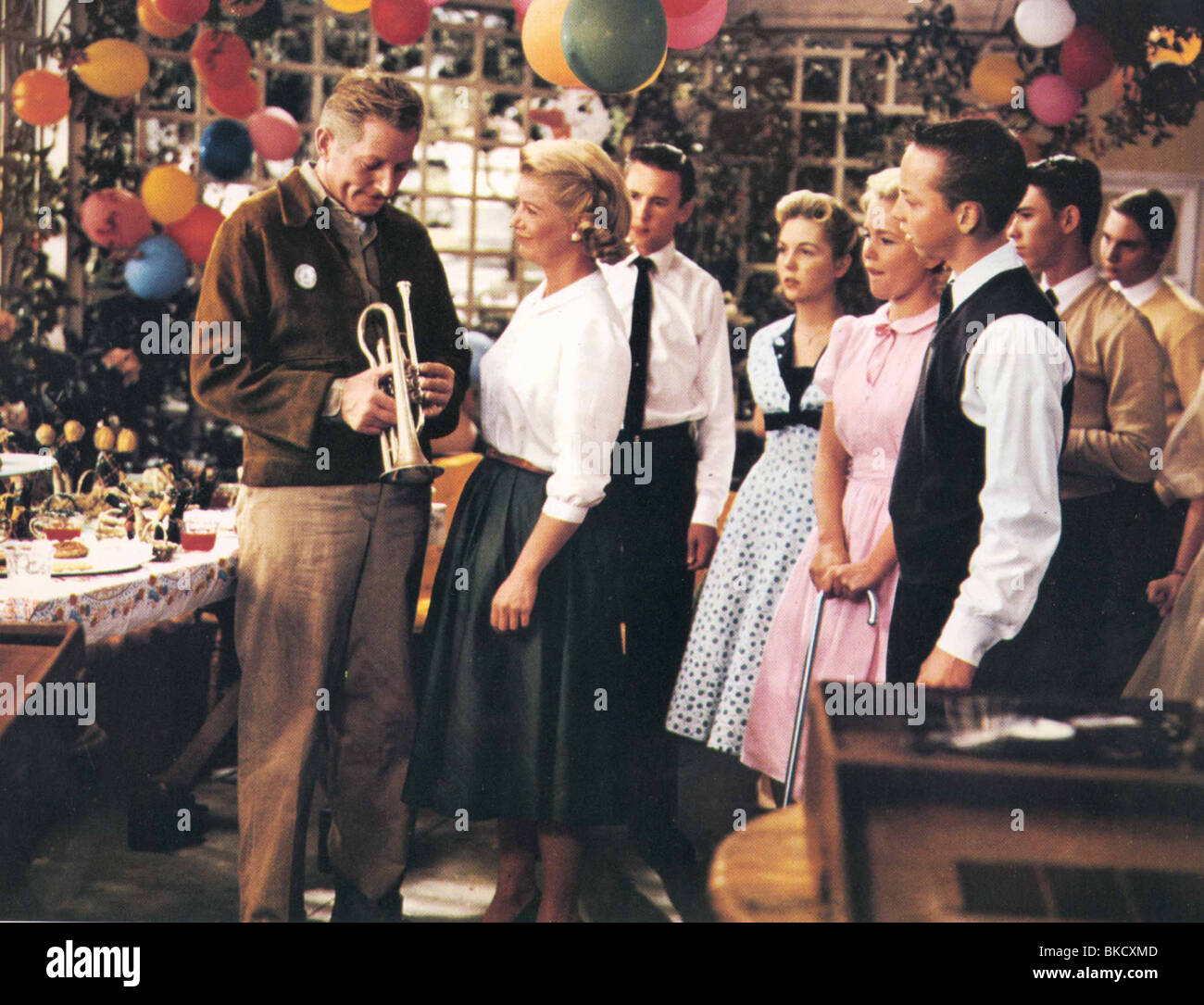← Back to Reviews
in
The Five Pennies
Danny Kaye plays it relatively straight in 1959's The Five Pennies. a sparkling musical biopic that traces the career of famed jazz cornet player Red Nichols, who would eventually become a pioneer in the musical genre known as Dixieland.

It's New York City during the Roaring 20's where Red is seen getting a job with Will Paradise's band but eventually quits because he wants to have his own band and play his own kind of music. The story follows the typical biopic route as red meets and marries a pretty band singer (Barbara Bel Geddes) who supports Red's passion in pursuing the career he wants, which finds Red playing with people like Tommy and Jimmy Dorsey, Glenn Miller, and Artie Shaw, but eventually Red forms his own band called Red Nichols and the Five Pennies. Just as they start achieving success, Red decides to give up his career when his daughter, Dorothy, is stricken with polio.

Director and co-screenwriter Melville Shavelson has mounted a lavish and simultaneously intimate look at a musician whose name may not be familiar but people have heard his music for almost an entire century without realizing it. Shavelson's story goes most of the typical directions that the 1950's Hollywood biopics go, but this one stands out due to a screenplay that has a little meat on its bones and a leading man stepping a little bit out of his comfort zone as an actor.

Danny Kaye was definitely an unconventional choice for the leading role in this story, but this is definitely a case of casting against type that worked. Kaye does get some opportunities to clown during the opening act. I was thoroughly amused with the scenes during the opening act where Paradise's band was doing a lot of work on the radio and Nichols kept screwing things up, mostly out of boredom with what he was doing. These scenes are definitely the Danny Kaye we are accustomed to seeing, but as the story takes a serious turn later, Kaye proves to be up to the challenge.

The film is rich with some terrific jazz and dixieland music, headed mostly by the real Red Nichols, who is actually playing all of Danny Kaye's cornet solos. The take on "Battle Hymn of the Republic" totally had my toes tapping and I also loved "Dixieland Lullaby" performed on the bus by Kaye and Bel Geddes (Bel Geddes singing was dubbed). The film also features Nichols' take on standards like "Good Night Sleep Tight" and "After You've Gone." The music is presented with a great deal of care and never sounds canned.

Danny Kaye proved himself to be an actor of substance with this role and was well-matched by Bel Geddes, who was a vivacious and intelligent leading lady who gave her role a substance that wasn't in the screenplay. Harry Guardino was terrific as one of the Five Pennies and no 1950's movie featuring jazz trumpeting would be complete without a cameo from Louis Armstrong. And that is a very young Tuesday Weld, in one of her first significant film roles, playing Red's teenage daughter, Dorothy. A special and unexpected surprise, a notch above the average biopic.
Danny Kaye plays it relatively straight in 1959's The Five Pennies. a sparkling musical biopic that traces the career of famed jazz cornet player Red Nichols, who would eventually become a pioneer in the musical genre known as Dixieland.

It's New York City during the Roaring 20's where Red is seen getting a job with Will Paradise's band but eventually quits because he wants to have his own band and play his own kind of music. The story follows the typical biopic route as red meets and marries a pretty band singer (Barbara Bel Geddes) who supports Red's passion in pursuing the career he wants, which finds Red playing with people like Tommy and Jimmy Dorsey, Glenn Miller, and Artie Shaw, but eventually Red forms his own band called Red Nichols and the Five Pennies. Just as they start achieving success, Red decides to give up his career when his daughter, Dorothy, is stricken with polio.

Director and co-screenwriter Melville Shavelson has mounted a lavish and simultaneously intimate look at a musician whose name may not be familiar but people have heard his music for almost an entire century without realizing it. Shavelson's story goes most of the typical directions that the 1950's Hollywood biopics go, but this one stands out due to a screenplay that has a little meat on its bones and a leading man stepping a little bit out of his comfort zone as an actor.

Danny Kaye was definitely an unconventional choice for the leading role in this story, but this is definitely a case of casting against type that worked. Kaye does get some opportunities to clown during the opening act. I was thoroughly amused with the scenes during the opening act where Paradise's band was doing a lot of work on the radio and Nichols kept screwing things up, mostly out of boredom with what he was doing. These scenes are definitely the Danny Kaye we are accustomed to seeing, but as the story takes a serious turn later, Kaye proves to be up to the challenge.

The film is rich with some terrific jazz and dixieland music, headed mostly by the real Red Nichols, who is actually playing all of Danny Kaye's cornet solos. The take on "Battle Hymn of the Republic" totally had my toes tapping and I also loved "Dixieland Lullaby" performed on the bus by Kaye and Bel Geddes (Bel Geddes singing was dubbed). The film also features Nichols' take on standards like "Good Night Sleep Tight" and "After You've Gone." The music is presented with a great deal of care and never sounds canned.

Danny Kaye proved himself to be an actor of substance with this role and was well-matched by Bel Geddes, who was a vivacious and intelligent leading lady who gave her role a substance that wasn't in the screenplay. Harry Guardino was terrific as one of the Five Pennies and no 1950's movie featuring jazz trumpeting would be complete without a cameo from Louis Armstrong. And that is a very young Tuesday Weld, in one of her first significant film roles, playing Red's teenage daughter, Dorothy. A special and unexpected surprise, a notch above the average biopic.
